Psi-Ops: The Mindgate Conspiracy Q&A
We talk to Midway about the game formerly known as ESPionage.
Psi-Ops: The Mindgate Conspiracy is the new moniker for Midway's third-person action game for the PlayStation 2 and Xbox that centers around Nick Scryer, a "psi-operative" who must thwart a terrorist organization known as The Movement, which is intent on worldwide mayhem. The game was formerly known as ESPionage, to denote Scryer's use of psychic powers such as telekinesis, pyrokinesis, and mind control, and its name change is part of a larger reworking of the title by Midway. Once due out this year, the game is now slated for a summer 2004 release in order to accommodate the implementation of a number of additions and refinements to the game. We had the chance to talk to Brian Eddy, the game's producer, about how development is going.
GameSpot: Tell us about the original concept for ESPionage.
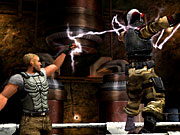
Brian Eddy: The idea of Psi-Ops: The Mindgate Conspiracy, originally called ESPionage, arose during an intense night of trying to remote-view across the globe into an unspecified terrorist compound by one of the team members who then realized that this would make a great game. They brought it up at a brainstorming meeting where everyone agreed that it sounded interesting, so the team (small back then) started doing some research on remote viewing and discovered a huge amount of information existed surrounding this power and its connection to various government programs, the military, and general conspiracy theories. Subsequent research revealed that all the major military superpowers over the last century have had some level of secret psi research going on, that psi soldiers and spies were deployed during nearly all major wars, especially during the cold war, and that these secret government groups may have had more than a small role in our history and our future. In some sense, you could almost say that the concepts for the game arose by themselves out of various historic facts, underground sources, and declassified documents that we had uncovered, and that we just connected the dots, linking them to major historical events, which helped us to flush out a backstory for the game and its characters. We can only wonder how far from the truth Psi-Ops really is.
GS: How did it come about, and where did you look for inspiration?
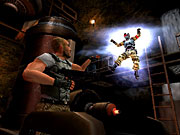
BE: At first, management was intrigued by the idea of Psi-Ops but didn't know how we would pull off making "mind powers" as interactive as we wanted to in a game. How would you control telekinesis? What would remote viewing look like? How could the powers work together, as well as in conjunction with traditional weapons? Many questions were asked, and it was up to us to prove we could not only do it, but also bring something really different to a genre full of copycat games. We decided that the best way to get the idea of the game across and flush out for ourselves how the game would look, feel, and play was to create a visual demonstration. 3D Movies were created that illustrated each proposed power, as well as the general feel of the game, and really got across the new twist psi powers could give to a third-person action adventure game. For instance, the telekinesis movie we made showed the hero picking up objects and people, followed by some scenes of them being thrown around and leaving blood splats on walls, floors, and ceilings. The mind drain movie showed the hero using stealth to sneak up behind enemies so that he could drain their psi energy until their heads exploded. These visual demonstrations showing actual gameplay went a long way towards communicating what was original in Psi-Ops and were a great first step during the design and concept phase of development in determining our future direction. Luckily, we also happened to work at a game company that recognized how cool the game would be and were not afraid to give something innovative like Psi-Ops a chance (although I admit that some strategic use of mind control may have been involved). In terms of inspiration, as I mentioned earlier, there is a huge amount of information out there relating to psionic powers and their connection to the military, numerous secret government agencies, and various conspiracy theories. We were able to take that abundance of information and weave a story that connected almost every major historical event over the last couple of centuries into the backstory for Psi-Ops.
GS: Why did you feel that the game's approach and title weren't working out?
BE: Our approach was actually working well, but in the end, time was our biggest enemy. We had to make this game from scratch, using an engine that we built almost entirely from the ground up, and develop the tools needed to put all the pieces together in a fairly short period. At the same time, we also had to compete with third- and fourth-generation games built on existing engines and tools. The game was constantly improving, but given the approaching ship deadline, we found ourselves having to accept that many aspects of the game were never going to be as polished as we knew they could be. However, at E3 it was clear to us that we really needed more time to create an AAA title. Midway management is now committed to making great games and not just rushing them out the door. So they decided to extend our schedule so that we could go back and really bring the game up to the next level. Our team has shown that it is more than capable of making Psi-Ops great; all the talent, experience, and commitment are there, but they needed more time to make it happen.
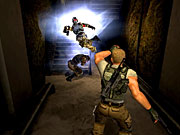
BE: One of the main reasons that Psi-Ops was given the extra time that it needed after E3 was based on the incredibly positive responses its concept received from both internal and external focus tests. When people took time and played the game and had a chance to delve into the very cool powers, story, and design, [and] multiple ways to play, it scored very high marks--in most cases higher than most of the very popular and critically acclaimed titles out there get. Really, I'm not exaggerating! The guy who moderated our recent focus tests has been in the industry for a very, very long time and had tested some past huge titles. He kept coming back to us with reports that placed us significantly above top games in many areas. Holy crap! We just needed more time to fix the problem areas. This extremely positive feedback from the focus tests made it clear to management that there really was something to ESPionage, but it was also just as clear that it needed some major work in order for it to be considered an AAA title. So, they gave us the extra time we needed, and the game is now coming together like we all knew it could.
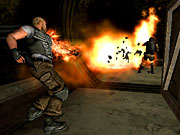
GS: How did you arrive at the new name and why?
BE: The original name, ESPionage, was a clever title with the play on words of ESP (extra sensory perception), but while it highlighted the term "ESP," it did not get across the idea of psionic powers as well as we wanted and tended to make people think that the game was just another military adventure. Although the game features much of what is cool about other military games out there (conventional weapons like machine guns, sniper rifles, grenades, cool stealth elements, etc.), it is much more about using the main character's psionic powers, and we wanted a name that really focused on that fact. Psi-Ops: The Mindgate Conspiracy as a name really seemed to combine the realistic military elements in the game while highlighting the psi abilities that make up its core. A lot of thought went into the name. Dozens and dozens of names were considered and thrown out (my favorite bad idea for a name was Psypocalypse) before we arrived at what we felt described the game. In the end, we felt we had arrived at a name that suggested both the military and psi aspects of the title, as well as one that hinted at the storyline (what is the Mindgate Conspiracy?).
GS: What has changed in the game, and why did you feel it had to?
BE: With our original time constraints, we had to make a lot of sacrifices in the quality of our graphics and the amount of time we could spend on improving gameplay. When we brought the game to E3, it was clear that many other games had raised the bar in terms of graphics (something easy to do when you are making sequels using existing technology) and that we needed to do a lot of work improving the look of the game to stand out. Our artists have proven to be more than capable in creating levels that really stand out graphically, but they were working towards deadlines, and the look of the game back then reflected that. Since we have been given more time, they have been able to go back and take the levels to... well, a new level! They really look awesome. Graphically most of the game looks very different from what we showed at E3. Extra time has allowed us to improve our tools and add features to the game that have had a dramatic impact on its overall presentation. At E3, we still did not have graphical features like depth of field, fog, multipass textures, and real-time lights working, all of which, along with the second pass the artists have been able to make, add a lot to the look and feel of the levels. The artists have also gone back and upgraded nearly every character in the game and have been feverishly adding them to our over 60 minutes of FMV. Similarly, our animation tools going into E3 still had bugs that we have since worked out, and now our motion-captured animation data really looks like it is supposed to when you see it in the game. This has had a major improvement on the controls and the way the characters interact with the world.
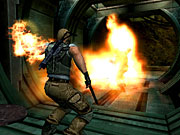
GS: What's the most challenging aspect of working on the game?
BE: Definitely the scale of the project! Third-person action adventure games are very complex, and what seem like even simple features or changes end up affecting nearly every aspect of the game. Make a change to how the characters climb objects or geometry, and suddenly the way they interact with every level in the game changes. Change the rate of fire for an enemy that appears in several areas of the game, and you find that places where the designers had already balanced gameplay suddenly break. Because of this we have created more and more area-specific scripted events and puzzles so that we can set up original situations without impacting the game as a whole. With all the elements that make up an expansive third-person action adventure it is important to work in new elements in a way that does not break the rest of the game.
GS: What do you feel are the key elements the game has to get right in order to fulfill its potential?
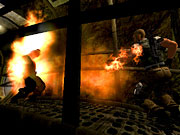
BE: Making the psi powers an extremely fun and integrated part to the gameplay. Psi-Ops: The Mindgate Conspiracy has all the elements that make up a great game, a truly unique twist in gameplay with the psi powers, puzzles, enemies, scripted events, weapons, characters, backstory (I could go on and on), but the challenge is balancing all those elements in a way that appeals to, and draws in, the player. The game isn't finished yet. We are hearing from players that they are already having a lot of fun playing it in many different ways. The extra time we received has allowed us to push the quality to a top-notch game. We are now seeing all the elements coming together to make Psi-Ops: The Mindgate Conspiracy the game we knew was there all along really start to shine.
GS: Thanks for your time.
Got a news tip or want to contact us directly? Email news@gamespot.com
Join the conversation